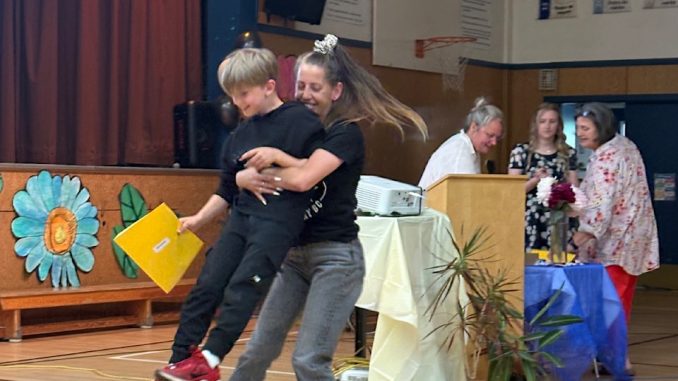
Courtenay’s Taija McLuckie’s journey through harm reduction to recovery –
by Marc Kitteringham, Black Press – read the source article here
The Eggs Benedict at Rhodos Cafe in Courtenay makes Taija McLuckie happy.
So does skateboarding, her kids, her friends and the people she loves. She also admits to being a bit stubborn, but inquisitive, always wondering “why” things are the way they are, and why she has to do things a certain way.
“I’m the ‘why kid'” she said, “which probably wasn’t very favourable to me growing up.
“I got myself into a lot of trouble, but I was also very involved,” she said. “I figure skated my whole life, competed on a provincial level, I had two parents who loved me, two sisters … a younger brother. I think where my story differs, and what maybe contributed to saving my life is that I grew up in a white, middle-class family and I was wanted.”
That rebellious streak, combined with a feeling of displacement from moving to different communities for many years as well as some traumatic events during her youth all led McLuckie to the point where she was in addiction.
“There was, like, no education around it besides ‘don’t do drugs, they’re bad, you’ll die.’ And then when you do the drugs, you don’t die,” she said. “I would get ecstasy by the time I was 13. Uh, mushrooms by the time I was 13. You just did it. No one ever like talked about it besides don’t do it.
“I think when you’re young though like you one you never think you’re going to die. It’s never going to happen to you, until it does.”
McLuckie’s story is similar to many who have had and currently have addictions. However, like a lot of things in her life she decided to find her own path to recovery and it’s only when she was able to do that that she’s gotten to a healthy point in her life.
A few years ago, McLuckie was living in Powell River trying to overcome her addiction. She attended an International Overdose Awareness Day event, and was introduced to the idea of harm reduction.
“I met the Community Action Team coordinator there and this whole world of harm reduction opened up. I had no idea, and was thrilled. I was like ‘what do you mean I have a disease?’ ‘How does this small section of my life determine who I am forever? Don’t tell me how to live my life.’ She gave me a chance, really.”
McLuckie was hired at the cold weather shelter in Powell River, and given an opportunity to work in the supportive housing building in that community.
Whereas many addiction recovery stories stress the need for total abstinence, McLuckie found that that didn’t work for her. What did, though, is going through detox and then using harm reduction techniques.
“I went down this rabbit hole of harm reduction,” she said. “It’s nice knowing that I had a choice, everyone’s recovery looks different. Nothing in life is linear, and an expectation of someone to not fall down on the way … like fuck it, see you. It’s like getting mad at someone for getting cancer again after they’ve been in remission.”
“Recovery looks different for everyone” she said. Her own journey to recovery, for example, is not abstinence-based. That harm reduction approach is what helped McLuckie turn her life around. She now works in outreach and harm reduction to help other people who are struggling.
To someone going through addiction and wanting to get into recovery, McLuckie says that they should know they have options.
“There’s an entire community that will be there no matter what,” she said.
For those who have loved ones going through it, she says that “It’s okay for people to to go down that way if if they choose and it’s also okay if they fall down in the exact same way that they like know how to do. it happens.”
“We are doing everything we can to mitigate risk, and to just love them. That’s all you can do. Just love them.”
To McLuckie, that’s the secret. It’s her answer for the question “what makes you happy?
“Oh my god, when my kids belly laugh,” she said. “Like you know that laugh that kids get that laugh? You just can’t help but like find out where it’s coming from. That it makes me happy .. to know that like yeah, I’m … I’m okay.”
Mental health, substance use, and grief services and supports are available. Residents may call Service Link at 1-888-885-8824 to learn about supports that best meet their needs. If someone is experiencing a crisis, they can contact the Vancouver Island Crisis Line, available 24/7, at 1-888-494-3888. To access mental health and substance use services, visit Mental Health & Substance Use Services or HelpStartsHere.gov.bc.ca. For harm reduction information and resources, like where to get Naloxone, visit Toward The Heart. The Village clinic, the only OAT (opioid agonist therapy) clinic in the Comox Valley accepting new patients, provides support for people struggling with opioid use. You can contact them at 250 331-6333.
Leave a Reply
You must be logged in to post a comment.